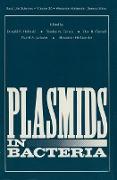Plasmids in Bacteria
BücherAngebote / Angebote:
The study of bacterial plasmids has not always been as popular as it is today. For many years, the molecular biology of pro cary otes was focused heavily on bacteriophage and plasmid investigations which were carried out in only a few laboratories. Whatever inter est existed in plasmids concerned the role of these extrachromosomal elements in bacterial conjugation, genetic exchanges, and antibiotic resistance, as well as in the structure of plasmids themselves. Gradually, however, it became increasingly evident that many of the special characteristics displayed by bacteria of medical, agricul tural, industrial, and environmental importance are determined by genes carried by plasmids, and this interest in plasmid-encoded functions, such as bacterial virulence properties (exotoxin produc tion, serum resistance, adhesiveness), metabolism of organic com pounds, plant tumor formation, and biological nitrogen fixation, led to increasing study of. the plasmids that carry these genes. Inves tigations of other plasmid-related properties such as replication and recombination have yielded much information about fundamental biological processes, information having implications that extend far beyond the particular plasmids under study. Concurrently, plas mids were playing a key role in the discovery of bacterial transpos able elements and were proving to be increasingly useful in the elu cidation of mechanisms responsible for a variety of chromosomal rearrangement events in bacteria and plants. Their status as "mini chromosomes" that could be isolated easily from bacterial cells and then reintroduced into other cells by transformation is of fundamen tal importance in this regard.
Folgt in ca. 5 Arbeitstagen




